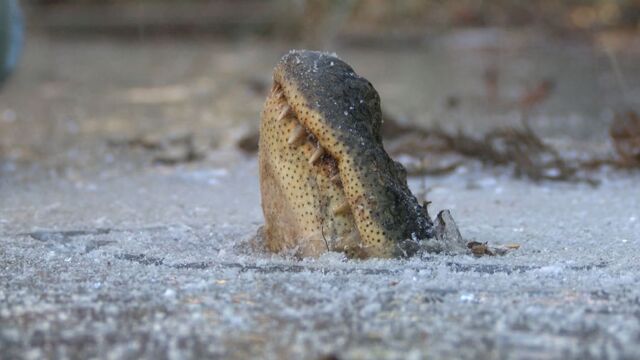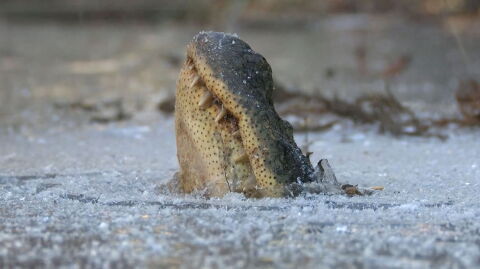The cold wave affecting the United States has given rise to impressive shows and unexpected phenomenon. After discovering frozen sharks in Massachusetts, a particular animal behaviour to the cold has come to light. Alligators and reptiles in general, wintering (also called misting).
Discover our latest podcast
It was seen at the Shallotte River Swamp Park in North Carolina. Alligators usually spend their time basking in the sun but in a recent video, we can see them being very lethargic. Disappearing under the frozen water, they have only their muzzles poking out of the ice.
Wintering, a survival tactic
This observation reveals a fascinating reflex instead of undue worry. Since alligators cannot regulate their body temperature, they must draw heat from the environment. In this case, the marshy surroundings provides hospitable conditions.
The alligators were careful to leave their muzzles sticking out of the water to breathe. When the temperature drops, their body reacts by slowing down considerably. Their energy consumption decreases, heart rates go down to about 5% the usual rate and their senses, still on alert, are slowed down.
In fact, their bodies no longer have enough heat to continue their activities, circulate the blood normally or even digest food. This feature, like hibernation in mammals, is a survival tactic. It helps them survive adverse circumstances, such as cold spells, provided that they do not last too long.
A variable phenomenon
Reptiles remain vulnerable throughout the period, and those that winter after being wounded or sick will not be able to heal optimally and will be more vulnerable to waking up to predators. The duration of the phenomenon is very variable depending on the species and ecosystems they have adapted to: some of them, living in the equatorial regions, never seem to winter, but may occasionally reduce their metabolic activity.
The alligators of Shallotte River Swamp Park were found fully mobile two days later, after the ice melted. According to Georges Howard, the park's general manager, the reptiles would certainly not have held more than a week in water whose temperature was measured at 4° C.
Check out the video above for more...















